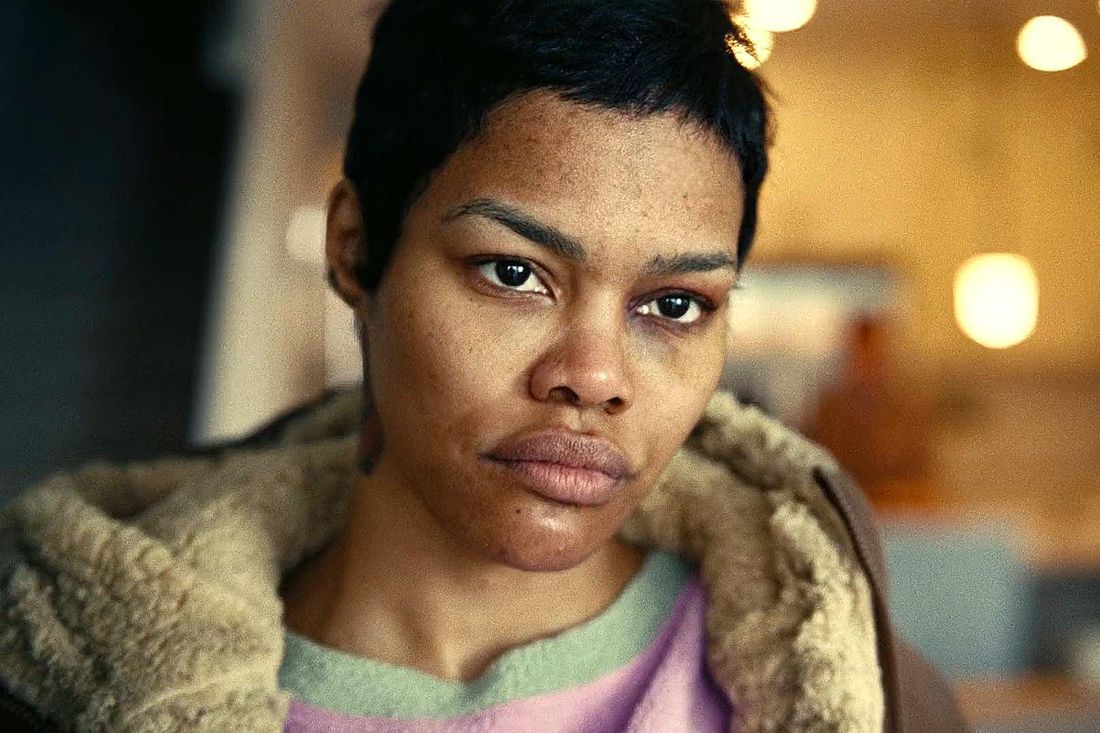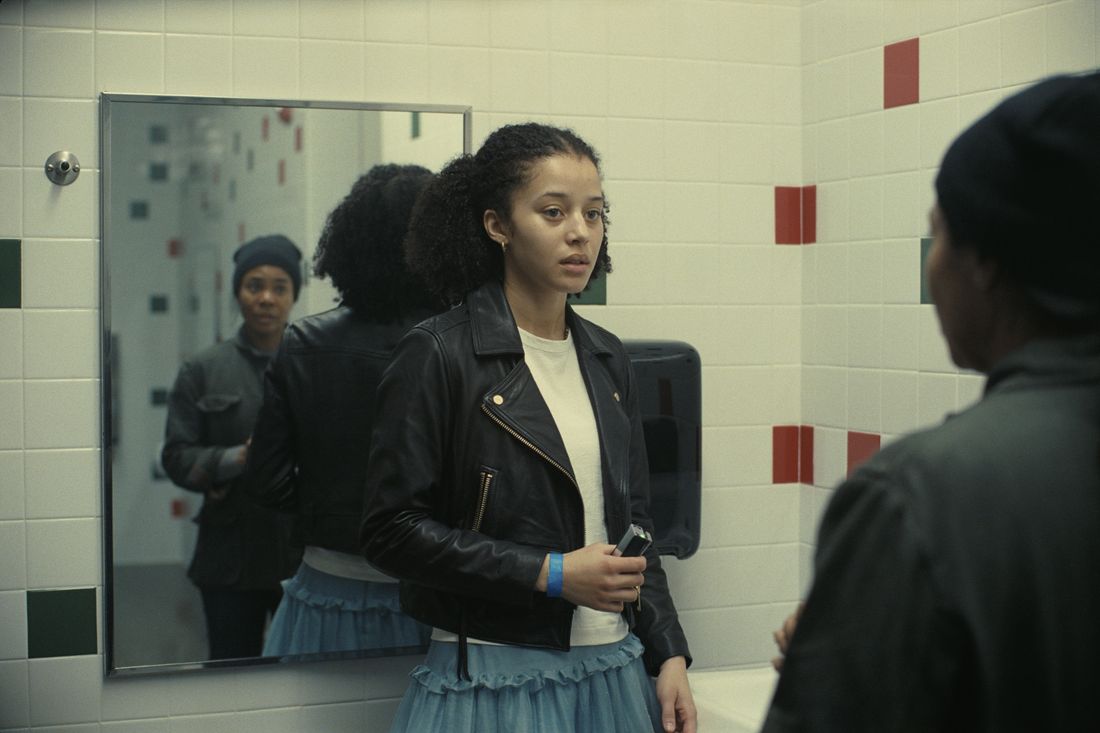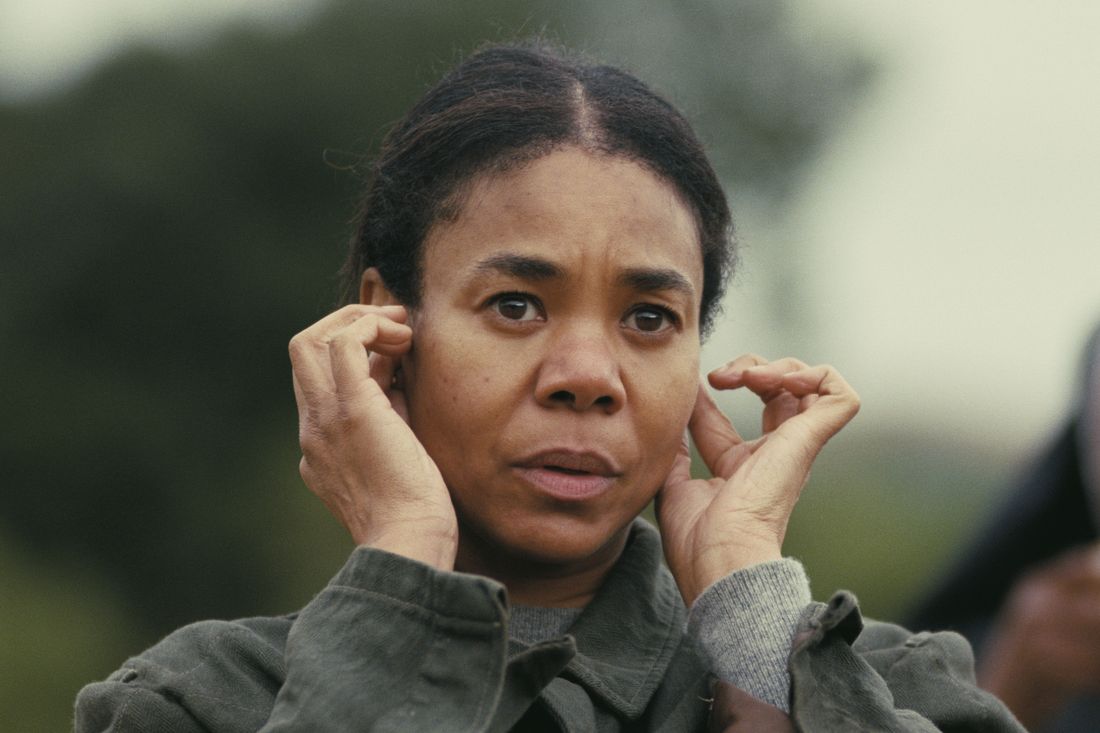
I saw the film One Battle After Another and then, walking out of Chicago’s Music Box Theatre on a surprisingly warm fall day, I learned that Assata Shakur had passed away. Shakur was a well-known activist and member of the Black Liberation Army. In 1977, she was found guilty of killing a New Jersey state trooper during a shootout where she and another activist were also injured – the other fatally. She escaped from prison in 1979 with help from other BLA members and eventually received political asylum in Cuba, where she lived until her death. Even during Barack Obama’s time as president, she remained on the FBI’s Most Wanted Terrorists list, with a $2 million reward for information leading to her capture. Throughout her life, Shakur maintained her innocence.
Teyana Taylor drew inspiration from Tupac Shakur’s complex and often debated persona for her role as Perfidia Beverly Hills in Paul Thomas Anderson’s gripping new film, One Battle After Another. The movie begins with a close-up of Perfidia as she surveys an immigration detention center on the U.S.-Mexico border. Perfidia is a key figure in the French 75, a radical left-wing group whose daring raid on the facility—and the consequences that follow—make up the first half-hour of the film. While the rest of the group focuses on helping immigrants escape, Leonardo DiCaprio’s character, a bomb expert nicknamed “Ghetto” Pat, creates a dramatic explosion to announce their revolution and, primarily, to get Perfidia’s attention. However, she’s distracted, keeping her gun trained on Colonel Steven J. Lockjaw (Sean Penn), the facility’s head officer. Lockjaw, with a voice reminiscent of Robert F. Kennedy Jr. and a troubling interest in Perfidia, is portrayed as both a darkly comedic figure and a chilling representation of state-sanctioned violence.
From that point on, Anderson navigates major changes: Perfidia’s growing romance with Pat, her pregnancy and struggles with postpartum depression, the development of a complex psychological relationship with Lockjaw, the decline of the French 75, and the resulting fallout for everyone involved. Perfidia betrays her friends to avoid prison after a failed bank robbery, and tragically, she kills a Black security guard. While the character may have been inspired by Assata Shakur, it’s important to note that Shakur herself never informed on anyone.
The story resumes sixteen years after Perfidia, now going by Pat, has broken free from witness protection. She narrates that the world hasn’t changed much. Meanwhile, Ghetto Pat, now known as Bob, is a frustrating and overprotective father to his sixteen-year-old daughter, Willa. Leonardo DiCaprio delivers a comedic performance as a directionless, yet energetic, former revolutionary, often seen vaping or finishing a joint in unusual ways. However, the carefree atmosphere is shattered when a figure from Pat’s past, Lockjaw, begins to pursue her and Willa, forcing them to confront a history that never truly faded.
One Battle After Another delivers a surprisingly rich and complete cinematic experience, especially considering its large budget (over $130 million). The film is beautifully shot and directed, showcasing impressive visual style. It also manages to explore complex ideas in a visually exciting way. The movie moves quickly between serious character moments and lighter, internal conflicts. While the humor sometimes lessens the impact of the film’s darker themes, at its best, it creates space for powerful performances, particularly from Teyana Taylor as Perfidia.
Perfidia is a challenging character – selfish, tough, and unapologetic. The film presents a realistic and flawed portrayal of Black womanhood, which is something I’ve been wanting to see. It’s not about an ideal, but something far more honest. She’s genuinely complex and feels incredibly real. The image of her heavily pregnant and firing a machine gun perfectly captures this. She isn’t the typical warm, selfless mother figure; she’s jealous of her daughter, struggling with hormones and the trauma of childbirth. Every scene and voice-over highlights the tension between who she is and what society expects her to be. Taylor’s performance doesn’t ask us to like Perfidia, but to be powerfully moved by her.
While the film features Taylor and others, it’s the Black women – Infiniti and Regina Hall, in particular – who truly carry the story. They provide a strong emotional center during the film’s most complex parts. If you’re unfamiliar with director Paul Thomas Anderson’s work, you might expect a movie about revolutionaries to focus on freedom, but Perfidia is actually a father-daughter story exploring how past mistakes affect future generations. The film best captures the feeling of today’s America – both ridiculous and dangerous – thanks to the talent of its actors. The Black women in the film handle the most difficult and important conversations, and it’s captivating to see them bring depth to a script that sometimes feels incomplete.

Consider the scene where Taylor portrays Perfidia’s sexual encounter with Lockjaw, which starts after he finds her planting a bomb. He had been following her for some time, not out of concern for the mission, but because of his attraction to her. Their relationship continues as long as she meets him at a motel. The film notably focuses on Lockjaw’s objectifying gaze as he watches Perfidia before this meeting. His initial sexual desire is interrupted when he sees Pat affectionately touch her, both of them clearly enjoying a genuine connection. After their first encounter, Perfidia briefly shows a flash of regret as she leaves the motel and walks into the night. However, the script doesn’t offer much insight into her feelings about losing control of her sexuality in a forced situation, or her betrayal of Pat. Later, her motivations for betraying her allies to save herself remain unclear. Throughout these moments, Taylor presents Perfidia’s revolutionary work as a purely emotional response—a way to protect herself.
I keep thinking about a moment with Taylor, around a campfire. Perfidia, who is now pregnant, asks the group, “What’s this pussy for?” and immediately answers, “War.” But it’s unclear what kind of conflict she means – Taylor’s expression suggests it could be both deeply personal and politically charged. It’s generally hard to understand the French 75’s motivations, aside from actions like bombing a politician’s office in protest of an abortion ban. The film isn’t focused on the specifics of a revolution; instead, it references the limitations of portraying one within a movie by playing Gil Scott-Heron’s “The Revolution Will Not Be Televised” during the credits. The movie also explores the complex relationships between the characters, particularly how Pat and Lockjaw connect with Perfidia.
Both Pat and Lockjaw represent a troubling pattern: the intense, and sometimes sexualized, attraction some white people have towards Black people. This is highlighted early on when Perfidia playfully asks Pat if he’s attracted to Black women, and Pat enthusiastically confirms it. Later, Lockjaw fixates on Pat, and uses the opportunity to reveal a shared obsession, confessing his own strong attraction. The film focuses too much on the humor in these moments, and portrays Pat as a somewhat sympathetic father, which prevents a deeper exploration of the underlying motivations. However, it’s clear these characters are warped reflections of each other, a point Taylor emphasizes through their contrasting behaviors – sometimes secretive, sometimes boastful.
Okay, so visually, the movie really focuses on the lead actress, and honestly, it gets a little overdone. It’s especially noticeable when her character starts acting on impulse – her desires don’t feel fully earned, and we don’t quite understand why she’s doing what she’s doing. There’s this one scene where she’s literally touching herself while explaining a bomb, and then immediately wants sex right before it goes off, and the actress nails it, she really commits to the role. The director seems to connect her attraction to revolution with her sexuality – the idea of taking freedom, even violently, is what excites her. But here’s my issue: while we get to know these revolutionaries as individuals, the film never really digs into what they’re fighting for, their actual political beliefs feel pretty shallow. It’s like we’re meant to care about the characters, but not necessarily the cause.
At the start of the bank robbery scene, Shayna McHayle, performing as Junglepussy, boldly declares, “I am what Black power looks like!” But the statement feels uncertain. Those unfamiliar with McHayle’s music might not realize the layered meaning, especially since the film uses one of her lyrics – “This pussy doesn’t pop for you” – in a crucial farewell note. Even after Taylor leaves the scene, her voice lingers, continuing to affect the story. Her final moments show her confidently crossing the Mexican border, her posture conveying a fierce determination to survive at any cost. Perfidia’s mother makes it clear to Pat that he isn’t good enough for her daughter, emphasizing her family’s history of rebellion and describing Perfidia as someone who’s always on the move. Ultimately, the film would have benefited from a little more exploration of what drives Perfidia – what she’s escaping from, or striving towards.

When Black people talk about revolutionary figures, it’s easy to idealize them, overlooking their imperfections and how their beliefs might have changed over time. People – even those who fought for radical change – are complex. Their political views, personal lives, and morals often blend and aren’t always clear-cut. This is powerfully illustrated by the character of Perfidia, who embodies energy, re-evaluation, and even desire. It’s a reminder that trying to neatly categorize Black characters in film as simply ‘good’ or ‘bad’ limits our imagination. Black revolutionaries, both in real life and on screen, shouldn’t be seen as perfect examples of what Blackness should be.
While the world of Perfidia is complex and full of contradictions, Regina Hall’s character, Deandra, is remarkably direct and unwavering. She’s completely focused on the mission and incredibly capable, and that’s all that seems to matter to her. She assesses every situation honestly, always calculating what it will take to survive, and carries this burden with serious determination. There’s a brief, touching moment when she says goodbye to Pat, offering a gentle hug and telling him she loves him as he starts his new life with a baby, hinting at a lighter side that could have been explored further. Hall’s performance powerfully shows how exhausting it is to fight against oppressive forces. It’s fascinating to watch her conversations with Sister Rochelle (played with dry wit by April Grace), where they discuss Willa, Perfidia, and the purpose of revolution. Sister Rochelle observes that Deandra has more fight in her than anyone else, saying this while casually smoking, revealing she herself has grown weary of the sacrifices needed for freedom.
Deandra serves as a contrast to Perfidia, highlighting what it takes to maintain one’s identity through intense political upheaval. However, the film gives her significantly less screen time than Perfidia, which is disappointing considering how much focus it places on Penn’s performance – his character’s rigid movements, nervous habits, and exaggerated display of American masculinity. Benicio del Toro as Sergio St. Carlos truly deserves more attention; his role as a karate teacher and leader of a revolutionary group offers the film’s most compelling look at the power of community. When neither Deandra nor Hall are on screen, the movie relies more on humor, often at the expense of its serious themes. For example, the comedic portrayal of Lockjaw and his attempts to join a white supremacist group diminishes the sense of urgency surrounding the film’s depiction of American unrest and violence, ultimately lessening the impact of the danger and horror these characters represent.
Willa, in the film One Battle After Another, truly shines. Chase Infiniti delivers a remarkable performance as a new actress, holding her own against seasoned performers. In a powerful scene where her character, Deandra, confronts Willa in an empty school bathroom, Infiniti subtly conveys fear, curiosity, and the confidence – and insecurity – typical of a teenager, all through small changes in her facial expressions. This moment captures the raw experience of a child realizing the complexities of her parents. Willa will soon discover that her parents are just as flawed and ever-changing as she is.
The film simplifies Willa’s character by focusing too much on her relationship with her father. A seemingly small moment – Pat admitting he doesn’t know how to style Willa’s hair – highlights the common struggle of biracial children raised by white parents, a theme even Maya Rudolph, whose mother was R&B singer Minnie Riperton, has touched upon. However, this feels like a surface-level exploration, as the film doesn’t delve deeply into Willa’s feelings about her mother leaving or the complexities of Perfidia’s character – she was a revolutionary, but also flawed and secretive. We don’t see Pat and Willa truly discuss these issues. Instead, the film ends with Pat giving Willa a letter from her mother, where Perfidia reflects on her past and hopes for a better future for Willa’s generation – a future she and others like her couldn’t achieve.
While Anderson’s choice to present a biracial Black character as a symbol of hope feels slightly idealistic, the film One Battle After Another doesn’t truly challenge the status quo. It sometimes feels like the movie should be bolder in its political statements, given its willingness to confront a difficult moment in time. Many studio films shy away from current issues – the denial of facts and the spread of misinformation – so Anderson’s attempt to acknowledge this strangeness does raise expectations. Ultimately, the film leans towards a hopeful, even somewhat idealistic, vision. Lockjaw’s attempt to control Pat and Willa fails, and Willa embraces a future of activism, heading to a protest in Oakland. Pat, meanwhile, abandons his paranoia for the distractions of technology, happily taking selfies with his new iPhone. The future clearly belongs to Willa, leaving Pat with no apparent desire to revisit his political concerns.
The first half-hour of this movie sets the tone for everything that follows. Rather than fully depicting the harshness of current events, the film presents them honestly, without sugarcoating. The unease created by certain characters’ actions – like Perfidia betraying her friends or Lockjaw’s disturbing desires – lingers throughout. The director deliberately leaves much open to interpretation, which can be confusing, but also prompts viewers to consider the meaning behind the film’s absurdities and what we expect from political storytelling. While all films carry a political message, filmmakers shouldn’t feel pressured to deliver a perfectly tailored, moralizing story. The script offers only glimpses into the inner lives of the Black women characters, but this allows the actresses to truly shine. The film isn’t about providing answers; it’s about exploring the humanity of the people within it.
Read More
- Tom Cruise? Harrison Ford? People Are Arguing About Which Actor Had The Best 7-Year Run, And I Can’t Decide Who’s Right
- Gold Rate Forecast
- Adam Sandler Reveals What Would Have Happened If He Hadn’t Become a Comedian
- Brent Oil Forecast
- What If Karlach Had a Miss Piggy Meltdown?
- Abiotic Factor Update: Hotfix 1.2.0.23023 Brings Big Changes
- Answer to “Hard, chewy, sticky, sweet” question in Cookie Jam
- Katanire’s Yae Miko Cosplay: Genshin Impact Masterpiece
- Arc Raiders Player Screaming For Help Gets Frantic Visit From Real-Life Neighbor
- ETH PREDICTION. ETH cryptocurrency
2025-11-24 20:57